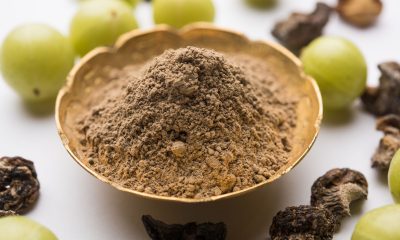Health
Benefits of alkaline water

Discover the benefits of alkaline water.
You may have already heard about alkaline water and its many properties and benefits.
And, although there are few studies on the matter, many companies and individuals maintain that drinking alkaline water frequently is beneficial for health.
Its promoters claim that it can help delay the aging process, regulate the body’s pH level and prevent diseases such as asthma, dermatitis, neuralgia, among others.
And so much, and so contradictory, is the information about alkaline water, that a large number of people, concerned about their well-being, have turned to see it as a very good alternative to improve and maintain health.
But what is true in this?
What is alkaline water?
It is a type of water subjected to an ionization process that separates the alkaline and acidic fractions, increasing the pH and raising it to more than seven units.
The pH of water is determined by the minerals that are in suspension and can be defined as the measure of the acidity of a medium.
Seven (7) is the pH balance point. Below that level, it is considered an acid medium, and above 7 a basic or alkaline medium.
It must be remembered that the planet’s natural water is found in acidity levels between 6.5 and 9 pH units. Levels higher than 9 are usually toxic.
It is important to clarify that if the degree of alkalinization of the water is low, it does not have to cause any problem to the human being. However, excessively alkaline waters can cause damage to the stomach.
According to Healthline, one of the negative side effects of drinking alkaline water includes reducing the natural acidity of the stomach.
How is alkaline water obtained?
Alkaline water can be obtained in different ways. One of them is to buy it packaged in supermarkets or health food stores.
However, in 2019 the Federal Consumer Protection Office conducted a qualitative study of 22 alkaline water brands, in which it concluded that 19 of those 22 products offered unproven benefits on their labels to the consumer.
It can also be obtained through water purifiers, whose filter system retains sediment and bacteria, providing water with a high degree of minerals such as sodium, calcium, magnesium, and potassium.
Another way to get it is at home. One option is to alkalize the water by boiling it for 5 minutes. In this way, it will increase its pH to 8.4, which is already considered alkaline water. It can also be obtained by adding half a tablespoon of baking soda to a glass of water. The pH will rise to 7.9.
In both cases, it’s important to use distilled water, because tap water or bottled water may have other additives.
What is the pH of water?
After talking so much about pH, you may be wondering what it is. The pH is a test that is carried out to know the quality of the water and indicates its acidity or alkalinity. Typically, these measurements are run on a scale of 0 to 14, with 7.0 being the neutral measurement.
From here, and above 8 points, they are considered alkaline. Below, they are considered acidic, always keeping in mind that in these measurements each point represents a tenfold change in acidity. That is, a pH of 6 would be 10 times more acidic than pH 7.
To give an example, we will say that lemon juice, which is an acidic liquid, has a pH of 2.5, while coffee has a pH of 5. On the other side of the scale, with a pH of 12, we would have water. limestone, which is when rainwater falls on an area with porous rock and soaks into the ground.
As it filters through the rock, it picks up and dissolves particles and minerals such as calcium and magnesium, gaining hardness and alkalinity.
At this point, you will surely ask yourself, what is the recommended pH of the water? According to experts -as established, for example, in the relevant regulations of the European Union- the pH of drinking water should be between 6.5 units and 9.5 units.
How to measure the pH of the water
There are manual and automatic pH meters. They are very simple and easy-to-use devices. And although automatic ones are more expensive, a manual meter will be just as effective at regulating water.
It is a kit that includes a test tube, two tubes, and reagents (substances or compounds to cause a chemical reaction).
You just have to take a sample of the water and, after following the instructions on the package, check what color the water stained with the reagent acquires.
Once the color is obtained, you should read the manufacturer’s instructions to know the degree of alkalinity.
Benefits of alkaline water
There are many benefits attributed to alkaline water. However, many studies are still lacking in this regard. Among the benefits that drinking alkaline water is said to have are:
It helps detoxify the body. Drinking alkaline water daily can neutralize acidity and remove acidic waste products from cells and tissues.
What is an antioxidant? Alkaline water is said to act as an antioxidant, scavenging and neutralizing harmful free radicals that damage skin and are responsible for aging.
This occurs because it supposedly can give up electrons and can effectively neutralize and block free radical damage in the body.
It helps balance the pH of the body. Alkaline water helps balance the body’s pH, which tends to be acidic due to a high-acid diet, stress, and exposure to environmental toxins like smog.
That improves the immune system. According to alkaline water enthusiasts, it preserves the immune system in a better state, which, as you know, is in charge of preparing the body to fight diseases.
That improves hydration. In the case of exercise-induced dehydration, the idea is supported that electrolyzed alkaline water reduces blood viscosity and vascular resistance.
What is an adjuvant in skincare? In addition to the health benefits attributed to drinking it, bathing in alkaline water is said to improve skin-related problems as well.
Lowers blood glucose levels. In some Asian countries, studies have been carried out that have shown that drinking alkaline water balances the functioning of the pancreas, thus helping to control blood glucose levels.
It helps in disorders of the gastrointestinal tract. Since alkaline water has a higher pH, its natural ability to neutralize acids in the stomach makes it a good choice for treating gastrointestinal tract disorders such as hyperacidity, diarrhea, etc.
It is said that in cases of laryngopharyngeal and gastroesophageal reflux diseases, alkaline water is efficient in neutralizing acid in the stomach.
That prevents osteoporosis. The human body strives to be slightly alkaline. The ideal pH level is 7.3 to 7.45. Alkaline water, which is obtained through purifiers, reaches these values and can even exceed them.
Those levels are very favorable for the human body. Well, consuming alkaline water prevents the body from extracting calcium from the bones to bring them to an alkaline state. That way you would be helping to prevent osteoporosis.
Is it good to drink alkaline water?
Some people claim that a more alkaline diet – including drinking alkaline water – can help reduce the body’s acidity and thus lead to better health and fitness.
And while the term “alkaline” has become a buzzword in health circles, the idea that everyone needs to drink alkaline water is a bit of a stretch.
Alkaline water is a controversial topic. Many health professionals say that there is not enough research to support the many health claims made by users and sellers.
Differences in research results may be related to the types of alkaline water studies.
According to the Mayo Clinic, plain water is best for most people and they maintain that there is no scientific evidence to fully verify the claims made by supporters of alkaline water.
However, some studies suggest alkaline water might be helpful for certain conditions.
For example:
A 2012 study found that drinking naturally carbonated alkaline well water with a pH of 8.8 can help deactivate pepsin, the main enzyme that causes acid reflux.
Another study suggested that drinking alkaline ionized water may have benefits for people with high blood pressure, diabetes, and high cholesterol.
A more recent study, involving 100 people, found a significant difference in blood viscosity after consuming high-pH water, compared to regular water, after intense training. Viscosity is the direct measure of how efficiently blood flows through the vessels.
Those who consumed water with a high pH reduced viscosity by 6.3% compared to 3.36% for standard purified drinking water.
This means that blood flows more efficiently with alkaline water. This can increase the supply of oxygen to the entire body.
However, beyond these isolated studies, more research is needed regarding alkaline water. In particular, research is needed to verify whether alkaline water offers all the benefits claimed by its promoters.
Despite the lack of proven scientific research, proponents of alkaline water still believe in its health benefits.
Therefore, when asked if it is worth buying and consuming this type of water, the answer is that it is better to hydrate with purified water.
There is a wide variety of point-of-use water purifiers on the market, both for offices and for the home, that purify water from the public network to obtain a liquid free of bacteria and viruses, with the pH that our organism needs.
There is a 2012 study that states that while an alkaline diet (including water) can reduce morbidity and mortality from chronic diseases, regular consumption of fruits and vegetables and an overall healthy diet are necessary.
Alkaline water is not a miracle product and is not a substitute for the benefits of a proper diet and healthy lifestyle.
It is also necessary to take into account that each organism has a unique pH, and our bodies naturally do a fantastic job of maintaining the pH of the blood within the necessary levels. Therefore, it is important to be cautious.
Finally, although there is indeed no contraindication regarding the consumption of this type of water, it is important to take into account how much alkaline water should be taken per day since it is not recommended to exceed its consumption since the body will always require natural liquid; that is, neither very alkaline nor very acidic either.
More than alkaline water, we need to improve our lifestyle
As you have seen, there is not enough research to support the benefits attributed to alkaline water.
It should be understood that the benefits could only be confirmed when combined with a healthy diet (rich in fruits, vegetables, legumes, and whole grains), an active lifestyle (30 minutes of daily exercise), healthy sleep and rest habits, as well as avoid the consumption of alcohol and tobacco.
Health
7 Benefits of jujube seeds and side effects

Table of Contents
Health
Benefits of coconut water in pregnancy

Discover the benefits of coconut water in pregnancy.
Coconut water is a clear, sweet, energizing isotonic drink that helps your body replenish lost fluids. Also known as Nariyal Pani and Elaneer in India, it is known for its versatility and countless nutritional benefits.
IS IT SAFE TO CONSUME COCONUT WATER DURING PREGNANCY?
Yes, it is safe to drink coconut water, but in moderation, as it contains natural vitamins and minerals.
Having coconut water in the first trimester helps curb dehydration resulting from morning sickness. It’s also good for heartburn and constipation, common symptoms of pregnancy.
You can drink coconut water at any time, but the best time is early in the morning. It is healthier, as the electrolytes and nutrients can be easily absorbed when the stomach is empty.
The nutritional benefits present in a cup of coconut water include:
•Calories 46
•Sodium 252mg
•600mg potassium
•Carbs 8.9 grams
•Dietary fiber 2.6 grams
•Sugars 6.26 grams
•Calcium 6%
Benefits of coconut water in pregnancy
You can reap its benefits only when you consume fresh water, as it begins to ferment when left open and exposed to air.
1. NATURAL DIURETIC:
During pregnancy, uric acid levels should be normal in your body system. Coconut water is a diuretic and increases the need to urinate due to the presence of potassium, magnesium, and minerals.
They help eliminate toxins and cleanse the urinary tract. Thus, it improves kidney function and prevents kidney stones and infections. It also prevents urinary tract infections, which reduces the chances of preterm labor.
2. OFFERS ESSENTIAL ELECTROLYTES:
The need for electrolytes increases during pregnancy because conditions like morning sickness, nausea, and diarrhea dehydrate the body. Coconut water supplies all five essential electrolytes: minerals, sodium, calcium, potassium, and phosphorus, which calm the body and provide energy.
These electrolytes transmit electrical charges in your body and aid in muscle function. They also help maintain your body’s pH levels and control blood pressure levels. It is known to have cooling properties, which prevent conditions such as bilious fever and vomiting.
3. RELIEVES HEARTBURN AND CONSTIPATION:
Hormonal changes during pregnancy lead to various problems like heartburn, constipation, and indigestion. The rich content of dietary fiber in coconut water strengthens the digestive system, improves digestion, regulates pH levels, and prevents constipation.
Ayurveda considers young coconut water to be an excellent laxative. Improves metabolism and detoxifies the body. Coconut water is a natural acid neutralizer and thus prevents heartburn.
4. TREAT INFECTIONS:
Coconut water is rich in vitamins, essential minerals, and antioxidants, which boost your immune levels, providing resistance to infections. It contains lauric acid, a medium-chain fatty acid responsible for the production of a powerful antiviral monolaurin, Michelle-Lee Young writes in the book “Two Trees and Twelve Fruits That Will Change Your Life Forever.” Lauric is a disease-fighting acid that kills harmful bacteria and infections like the flu, and HIV, and retains good bacteria.
5. IMPROVES HEART HEALTH:
Low electrolyte level increases blood pressure. Drinking coconut water improves levels of potassium, magnesium, and lauric acid, which help regulate blood pressure. Improves good cholesterol and fights bad cholesterol.
The vitamins, essential proteins, and electrolytes in coconut water control sugar levels, and blood pressure levels, and improve circulation. A glass of coconut water every day is particularly helpful in the last trimester when there is increasing stress from labor that can increase your blood pressure.
6. MAINTAINS A HEALTHY WEIGHT:
Coconut water is fat-free and low in calories. As pregnancy adds extra weight to your body, coconut water prevents fat accumulation by removing bad cholesterol. It is an excellent replacement for sugary drinks and helps both the mother and the growing fetus to be healthy and fit.
7. NATURAL DRINK:
Coconut water is a tasty natural drink. It has no artificial flavors or harmful components. It is safe for you and your growing fetus as none of its components affect your health.
8. ENERGIZE AFTER TRAINING:
Coconut water is a natural isotonic drink, which helps you gain energy when suffering from dehydration, fatigue, and exhaustion. It is a great revitalizer
. If you exercise regularly to stay fit and strengthen your pelvic muscles, you can opt for coconut water as an energy drink. Hydration also improves skin elasticity, limiting the stretch marks that develop during pregnancy.
9. LOW SUGAR CONTENT:
Excessive sugar intake can lead to an increase in overall blood sugar levels. Coconut water has less sugar than other sports and energy drinks. You won’t gain pregnancy weight, and a diet low in simple sugars will reduce your risk of getting gestational diabetes.
10. ACCELERATES THE GROWTH OF THE FETUS:
Coconut water offers all the nutrients to the mother, essential to maintain and improve her health. Thus, it improves the health, growth, and proper nutrition of the unborn baby.
11. IMPROVES AMNIOTIC FLUID LEVELS:
Drinking coconut water improves the overall health and environment of your growing fetus. Coconut water taken especially in the third trimester increases amniotic fluid levels and improves blood volume and circulation.
ARE THERE ANY SIDE EFFECTS OF COCONUT WATER DURING PREGNANCY?
There is no evidence that coconut water has adverse effects on pregnancy. Like any other fruit or vegetable juice, it also appears to be safe. But there are two things to keep in mind:
•Coconut milk contains sodium, which may not be the right choice for pregnant women with preeclampsia.
•Ripe coconut water can cause constipation.
HOW MUCH COCONUT WATER CAN A PREGNANT WOMAN HAVE?
Moderation is always the key when it comes to eating a healthy diet. You can drink up to a glass of coconut water a day.
Consume the water soon after opening, as a fresh one will contain rich nutrients. Use a clean straw or pour it into a glass and drink.
It is always good to prefer natural coconut water to canned or bottled.
Do not consume coconut water if you react or do not like its taste.
HOW TO SELECT THE CORRECT COCONUT?
To enjoy the various benefits of coconut water, you need to know how to select them properly. These tips can help you buy fresh and tender coconut.
A fresh coconut will be light and sweet and will not contain coconut meat, the white, meaty, tender substance. A ripe or stale one will taste sour.
Selection: Choose medium-sized, clean, green walnuts, as they contain large amounts of water. Don’t choose coconuts that have hard brown shells and gray patches as they indicate ripe nuts.
Water: Shake the coconut vigorously near your ear to check for water. Select the ones that make a good splashing sound. A fresh coconut will contain almost a cup of water.
If you want to store coconuts at home, keep them in a cool place.
BENEFITS OF COCONUT MEAT DURING PREGNANCY:
1. GENERATION OF BREAST MILK:
Regular consumption of coconut meat during pregnancy improves the supply of breast milk after childbirth. Your baby will receive nutritious and rich breast milk. Also, coconut oil helps in the generation of breast milk.
It is also good during the lactation phase as it contains lauric and capric acids. These acids have antiviral, antibacterial, and parasiticidal effects, which protect the baby from diseases.
2. IMPROVES BLOOD CIRCULATION:
Blood volume doubles during pregnancy, causing swelling of the feet and legs. Poor blood circulation aggravates the condition. Coconut consumption improves blood circulation and prevents swelling and pain in the legs.
3. HELPS DIGESTION:
Consuming coconut meat and water prevents constipation as tender coconut meat acts as an excellent laxative. It is one of the best benefits of consuming a coconut in any form during pregnancy.
4. BETTER SLEEP:
Having coconut in combination with poppy seeds and ghee will improve your sleep cycle.
5. INCREASES METABOLISM:
When the coconut is mixed with spices, it helps boost metabolic activities in pregnant women.
COCONUT MILK DURING PREGNANCY:
Coconut milk is a thick, milky liquid obtained by grinding grated coconut meat. It is also an essential ingredient in many foods, especially Southeast Asian dishes.
Coconut can be consumed in any form due to its amazing health benefits. Coconut milk helps increase body fuel. It is completely safe to drink unless you are allergic to it.
BENEFITS OF COCONUT MILK DURING PREGNANCY:
1. ENHANCE IMMUNITY:
Coconut milk contains lauric acid, which is an antibacterial and antiviral fat, useful for pregnant women. This type of fat helps improve the immune system, according to the book “Coconut Oil and the Immune System” by Sherri Neal. The long-chain fatty acids straighten the blood vessels and reduce any blockages in the heart, thus improving the condition of the heart as well.
2. OTHER BENEFITS INCLUDE:
•It contains good amounts of iron, which can treat anemia.
•Improves digestive problems.
•It offers relaxation to the muscles and the nervous system.
•Controls blood sugar levels and blood pressure
•Relieves joint pain and scratches
•Makes your body fit and helps you lose weight
HOW TO PREPARE FRESH COCONUT MILK?
It is advisable to make coconut milk at home instead of opting for a packaged one.
Grate a whole coconut and add a cup and a half of hot water.
Let the mixture cool to room temperature.
Once the mixture cools down, strain to get the milk.
Coconut milk taken directly from fresh coconuts will contain approximately 450 calories and 50 g of fat. A cup of coconut milk (approximately 240 g) has the following nutritional values:
•Calories 550
•Fats 50.2gm (all types of fats)
•Cholesterol 0
•Sodium 40gm
•Carbohydrates 14gm (in 250gm of milk)
•Proteins 6gm
•Vitamin C 11%
•Iron 22%
•Calcium 4%
IS CANNED COCONUT MILK GOOD DURING PREGNANCY?
It’s safe to have canned coconut milk during pregnancy, but you need to make sure the can isn’t corroded, rusted, expired, or stored at dangerous temperatures.
Coconut milk contains considerable amounts of saturated fat, that is, 3 g in a tablespoon. Eating too much-saturated fat will increase the levels of good and bad cholesterol in the body. In the case of canned milk, you must take into account your level of consumption, since you should not exceed your daily requirement.
In addition to the above, other reasons why you may not choose canned coconut milk are:
1. BISPHENOL A (BPA):
It is a chemical that is typically used in the lining of cans used for packaged foods. This BPA can gradually leach into acidic, fatty, or salty foods like coconut milk, vegetables, tomatoes, and soups. One study claims that there is a relationship between high levels of BPA in mothers and neurobehavioral problems in babies.
2. GUAR GUM:
Guar gum is an additive present in canned coconut milk. It is a galactomannan, a polysaccharide, and is primarily a ground endosperm of guar beans.
There have been complaints such as severe abdominal cramps, indigestion, flatulence, and diarrhea, as beans are difficult to digest. In a clinical experiment, patients with intestinal problems showed improvement when they stopped using canned coconut milk in their diet.
3. FRUCTOSE MALABSORPTION:
It is a digestive disease characterized by impaired transport of fructose (a simple sugar found in fruits, vegetables, and honey) through the small intestine. Increased fructose levels in the gut cause bacterial overgrowth.
Therefore, it reduces the absorption of water in the intestine. Pregnant women with inflammatory bowel disease (IBD) and irritable bowel syndrome (IBS) are highly affected by fructose malabsorption.
According to nutrition data, coconut milk contains sugar, including fructose. Therefore, it should be avoided by those affected by IBD and IBS disorders.
Health
Disadvantages of miscegenation reproduction

Table of Contents
-

 Food5 months ago
Food5 months ago10 + Benefits of carrot juice and side effects
-

 Food5 months ago
Food5 months ago8 shocking benefits of leek juice and side effects
-

 Health5 months ago
Health5 months agoBenefits of guava leaves Sensually
-

 Health5 months ago
Health5 months ago10 shocking health benefits of Canary seed milk
-

 Health5 months ago
Health5 months ago7 health benefits of cashew leaves and side effects
-

 Health5 months ago
Health5 months ago13 shocking health benefits of Thai eggplant
-

 Weight Loss5 months ago
Weight Loss5 months agoKelly Osbourne weight loss 2022
-
Weight Loss5 months ago
Chrissy Metz Weight Loss Secret (2022)












